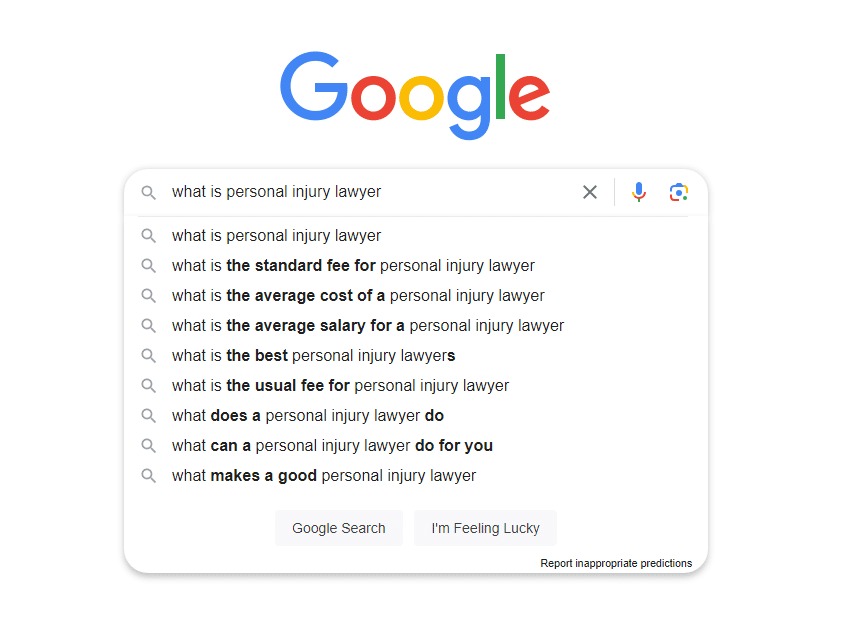In the competitive world of personal injury law, standing out from the crowd can feel like sprinting uphill. While case management and client service are crucial, building a strong online presence is another key factor in attracting and engaging potential clients. This is where content marketing, particularly blogging, shines.
Why Blog? The Benefits Speak for Themselves:
- Traffic Magnet: Blogs draw people to your website, potentially turning them into leads. SEO optimization further boosts your visibility in search results when people seek personal injury services.
- Authority Amplifier: High-quality blog content positions you as a thought leader, building trust and establishing your firm as a reliable resource.
- Client Rapport Builder: Blogs allow you to connect with potential clients on a personal level, addressing their concerns and demonstrating your expertise.
- Lead Generation Powerhouse: Informative and engaging content encourages readers to reach out for consultations, turning curious clicks into valuable leads.
Now, let’s dive into 5 specific blog ideas that will spark your creativity and ignite your firm’s growth:
1. Highlighting attorney experience
Individual Attorney Pages: Dedicate sections on your website to each attorney, showcasing their:
- Educational Background: Highlight prestigious universities, scholarships, or specific legal disciplines they mastered.
- Professional Journey: Tell a compelling narrative of their career path, emphasizing past firms, notable cases, or pro bono work.
- Awards and Recognition: Feature bar association accolades, awards from legal organizations, or recognition by peer-review publications.
- Personal Interests and Hobbies: Humanize your attorneys by sharing their passions outside of law, fostering connection with potential clients who share similar interests.
Attorney Blog Series: Assign each attorney a specific topic based on their expertise. For example, a medical malpractice attorney can delve into complex medical terminology, while a car accident specialist can analyze specific traffic laws.
“Ask Me Anything” Sessions: Choose platforms like Facebook Live, Reddit AMAs, or your website’s blog comment section to host Q&A sessions with individual attorneys. Promote these sessions beforehand on social media and announce the topics to attract relevant audiences.
Testimonials and Case Studies: Feature written or video testimonials from past clients highlighting their positive experiences with specific attorneys. Additionally, create anonymized case studies showcasing successful outcomes your attorneys achieved for past clients with similar injuries.
2. Thinking local
Partner with Local News Outlets: Pitch safety tip segments or informative articles to local news channels, radio stations, or newspapers. Highlight seasonal hazards, specific accident-prone areas, or legal updates relevant to your community.
Organize Free Safety Workshops: Collaborate with community centers, libraries, or senior citizen centers to host free workshops on topics like slip and fall prevention, pedestrian safety, or first responder procedures after car accidents. These workshops allow direct interaction with potential clients and showcase your expertise.
Analyze Local Legislation: Monitor recent changes in state or local laws impacting personal injury claims. Create comprehensive blog posts or infographics explaining these changes and their potential implications for injured individuals in your area. This positions you as a trusted resource and demonstrates your knowledge of the evolving legal landscape.
3. Answering the unspoken
Keyword Research Tools: Utilize tools like Google Keyword Planner, Ahrefs, or SEMrush to identify high-volume search queries related to personal injury law in your local area. Analyze the intent behind these queries based on Google’s “search intent categories” (informational, navigational, transactional, commercial) and craft content that directly addresses each category.
“Myth Buster” Blog Series: Dedicate a blog series to dispelling common misconceptions surrounding personal injury claims. Address myths like “I need a witness to file a lawsuit,” “I can’t sue my employer if I get hurt at work,” or “Insurance companies always settle out of court.” Provide clear explanations and legal references to debunk these myths and establish your credibility.
Step-by-Step Guides: Develop actionable guides on navigating the personal injury claims process in your state. Cover steps like filing an initial report, choosing the right attorney, gathering evidence, and negotiating with insurance companies. Offer these guides as downloadable PDFs or interactive webpages for easy access.
4. Google autocomplete magic:
Long-Tail Keywords: Explore longer, more specific phrases suggested by Google autocomplete when you type in broad terms like “personal injury lawyer.” For example, target queries like “best personal injury lawyer for car accidents in [your city]” or “slip and fall injury lawyer free consultation.” These reveal user intent more clearly and lead to unique blog topics.
Topic Clusters: Identify related autocomplete suggestions and group them into clusters based on a central theme. Create comprehensive blog posts that address each cluster’s theme, covering several related keywords. This approach provides a holistic understanding of the topic and improves your search engine visibility.
Trending Topics Monitor: Use Google Trends to identify trending topics related to personal injury law in your local area or nationally. Create timely blog posts addressing these trends to capitalize on current interest and attract new readers.

5. Tech-Savvy lawyer persona:
Showcase Your Tech Stack: Feature blog posts or website sections dedicated to the technology you utilize to enhance client experience. Explain how secure online portals, remote video consultations, legal research tools, or cloud-based document management systems benefit your clients.
Embrace Social Media: Actively engage on platforms like Twitter, LinkedIn, and Facebook. Share legal insights, industry news, behind-the-scenes glimpses into your firm’s culture, or even humorous legal memes. This humanizes your brand and attracts tech-savvy audiences.
Invest in Website Security: Ensure your website is secure with the latest encryption protocols and regularly updated security plugins. Offer mobile-friendly design and intuitive navigation for seamless user experience on any device.
Bonus Tips:
Collaborate with other professionals: Partner with doctors, chiropractors, or physical therapists to co-create informative blog posts. This expands your reach and offers valuable insights from different perspectives.
Run contests and giveaways: Host social media contests or offer free consultations to incentivize audience engagement and attract new leads.
Track your results: Use analytics tools to track your blog’s performance, identify what resonates with your audience, and adapt your content strategy accordingly.

